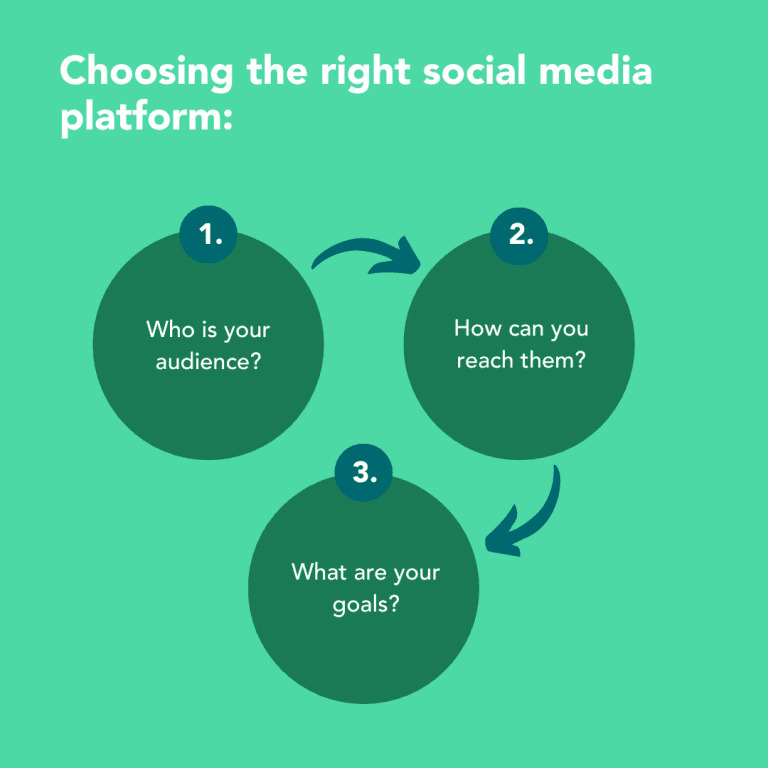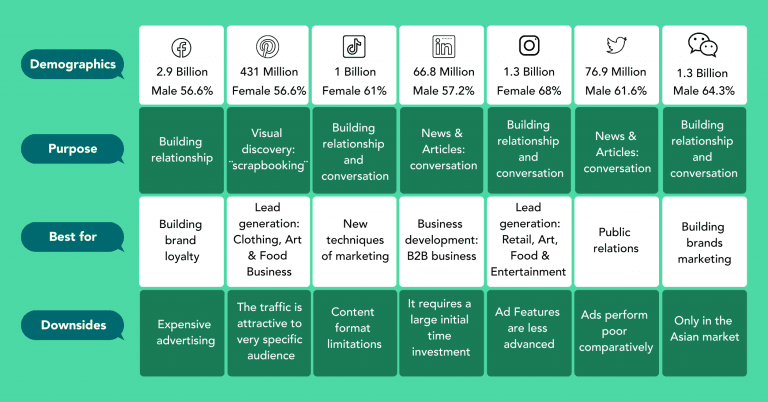With the world becoming more interconnected than ever, social media is now a vital way for businesses to engage with current and potential audiences. According to Smart Insights, 59% of the world’s population uses social media daily, with an average use of 2.29 hours. As such, there is no doubt that utilising social media well can bring a lot of benefits to a company. This can include spreading brand awareness, deepening customer loyalty, or generating leads and sales. However, with so many different social media platforms out there, it can be difficult to decide on which one to focus on.
In this article, we discuss insightful information on how to choose the right platform for your needs. Here are a few important points to keep in mind:
Key factors in choosing a social media platform
It is important to remember that each social media platform caters to a unique audience demographic and engages with them differently. Some are more visual-based, while others are more geared towards facilitating online conversations and interactions. Therefore, the social media platform you choose will depend on various factors, such as the type of business you are and who your intended audience is.
Here are a few key points to keep in mind before committing to a social media platform:

Who is your audience
This is one of the most essential criteria, as knowing who your target audience is will inform what social media platform you use, your marketing strategies, and how you communicate with them. Before getting started with any strategy, you should create an audience persona that breaks down a few important factors relating to your audience. For instance, their gender/sex, age range, the region they are mainly based in, common interests, pain points, where they can be often found online, and how they use a particular social media platform. It is also worth noting that a platform’s demographic can shift over time – for instance, Facebook users are gradually getting older, and are not often used by those under 18.
How can you reach them
You also need to consider the best way to reach your target audience. Is it through paid online advertising and sponsored posts? Or do your audiences prefer more organic, authentic content? Do they enjoy seeing image-based posts, or do they like more educational or entertaining video content? These factors will impact the content and format you engage your audience with.
What are your business goals
Be sure to also ask yourself what your business goals and objectives are and which platform best suits you. For instance, if your goal is to increase awareness of a particular product or service, you may create YouTube tutorials explaining your product or service and how it can benefit your customers. If you are more of a product-based business and seek to increase leads, you might choose an image-sharing platform to showcase and highlight your best or newest products to your audience so they know exactly what it looks like and how it can be used.

Overall, each platform has its unique selling point, advantages, and disadvantages that a company should consider.
If you want to share images, graphics, or videos, you might pick Pinterest or Instagram as your leading social media platforms. If you are targeting mainland Chinese customers – or are looking to expand into China, then WeChat is a great platform to build relationships and online conversations about your brand. If you target Genz’s or anyone younger than 20, you may want to get on TikTok, which concentrates on releasing short-form video content. On the other hand, Twitter and LinkedIn are much more text-based, with content generally focusing on sharing news, ideas, thoughts, and industry insights.
Pros and Cons of multiple social platforms
Of course, rather than just using one platform, if you have the manpower and expertise, you can use multiple platforms to assist with your social media strategy and promotion. In fact, Another Digital 2019 Report from WeAreSocial and Hootsuite not only indicated that 45 million Britons (67% of the UK’s population) use social media, but it also suggested there were considerable overlaps. However, there are advantages and disadvantages to doing so.
Here are a few things that you need to keep in mind before making your decision:
Pros
- Segmented audiences: Having multiple social media platforms allows you to target a variety of demographics and audiences.
- Localised news: For businesses requiring localisation efforts, multiple platforms can help engage and attract customers in certain geographic areas.
- Topic-specific focus: Some brands cover a wide range of topics. Therefore, creating a parent account with multiple accounts under the umbrella can help you to focus your attention on audience members interested in a specific niche.
Cons
- It takes more time and manpower to manage multiple social media accounts. As such, this can generate a lot of stress and workload, especially for smaller companies or start-ups.
- Multiple accounts can sometimes confuse customers about whom to follow, especially if an account is not clearly branded or inactive.
- When you create multiple accounts, there is a slight risk of losing followers from one account to another.
Summary
Overall, it is still possible for a company to use multiple platforms to reach a wider audience. In fact, this is something that is practised by a lot of businesses online. This is because brands cannot reach their full potential by clinging to one platform or channel only – this way, they start to stagnate.
Diversifying marketing channels also helps to lower risk, as you can pivot or tweak your strategy quickly in case something abruptly changes. If you have decided to use multiple social media platforms, then you should consider how to reach your target audience and plan your content appropriately.
Moreover, you should always continue to test and keep track of how your social media campaigns are doing over time. Only then will you know which platform is best suited for your brand.
With more than 20 years of experience working with various industries, MediaGroup Worldwide can expertly advise you on the best social media platform for your business. Get in touch with us.
Head of Paid
Sofie is a Head of Paid in MediaGroup. She is based in Copenhagen and leads our international Paid Ads team. Before Sofie joined MediaGroup, she worked in marketing and sales with communication responsibilities, consulting B2B companies across industries about branding and digital marketing. She holds a degree in Leisure Management from University College Sjælland in Denmark, where her interest and passion for management and adverting started.
Popular categories:
The Memorable Marketing by MediaGroup podcast series interviews leading senior marketers worldwide on all things marketing, campaigns, strategy, building awareness and everything that makes a brand successful.
Join the conversation by leaving your thoughts and questions, and we will be happy to chat with you. If you want to discuss your business marketing strategies in more detail or join our podcast as a guest, please reach out to us at: [email protected]
Latest Insights
Article
Getting started with data-driven attribution in Google Ads?
When it comes to paid advertising campaigns, marketers need to keep track of who has clicked or interacted with a particular ad. In the past, this was done by giving all the credit for a conversion to the very last ad a customer interacted with. This was known as the Last-click attribution model, and it has remained the default for years.
Quarterly marketing insights in our newsletter
We are committed to helping you get the best results in your digital marketing game. Our experts will give you actionable insights and knowledge, based on our experience, to tackle the biggest marketing challenges. Unsubscribe at any time.
Mediagroup Worldwide processes the above information in order to subscribe you to the newsletter. Privacy Policy
